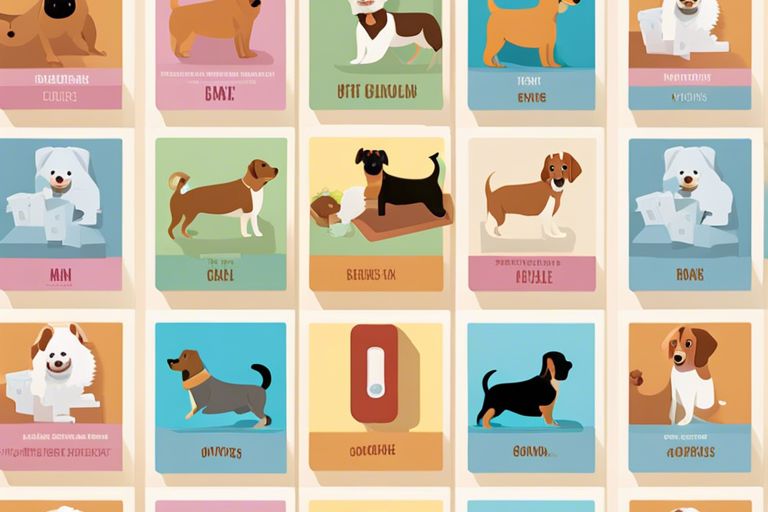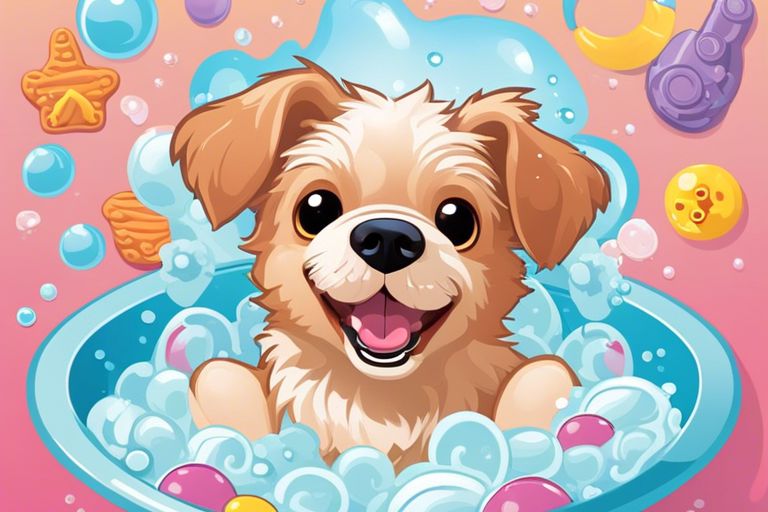As a devoted dog owner, I understand the importance of keeping our small furry friends mentally stimulated. Mental stimulation is critical for a dog’s overall well-being and can prevent negative behaviors such as anxiety, boredom, and even depression. To ensure that your small dog stays mentally sharp and satisfied, it’s crucial to incorporate a variety of engaging activities into their daily routine. Some of the best ways to achieve this include interactive toys, puzzle feeders, training exercises, and regular socialization with other dogs and humans. Additionally, incorporating daily walks, new scents, and changing up their environment can also help keep your small dog mentally stimulated and happy. By implementing these tactics into your daily routine, you can ensure that your small dog remains mentally sharp and content.
Key Takeaways:
- Interactive Toys: Invest in interactive toys such as puzzle feeders or treat-dispensing toys to keep your small dog mentally stimulated and engaged.
- Regular Training: Engage in regular training sessions with your small dog to provide mental stimulation and enhance their obedience and problem-solving skills.
- Outdoor Activities: Take your small dog on frequent walks, hikes, or visits to the dog park to expose them to new sights, sounds, and smells, which can help keep them mentally stimulated and prevent boredom.
Understanding Your Small Dog’s Mental Needs
Obviously, as a responsible pet owner, it’s essential to understand the mental needs of your small dog in order to provide them with the appropriate mental stimulation. Small dog breeds, just like their larger counterparts, have specific cognitive needs that should be addressed to keep them happy and healthy.
Cognitive Functions and Development in Canines
Small dogs, much like humans, go through different stages of cognitive development as they grow. These cognitive functions include learning, memory, problem-solving, and decision-making. In order to keep your small dog mentally stimulated, it’s important to engage them in activities that challenge these cognitive functions. This can include puzzle toys, interactive games, and training exercises that encourage them to think and problem-solve.
Specific Challenges for Smaller Breeds
Smaller breeds of dogs often face specific challenges when it comes to mental stimulation. Their small size can make it difficult for them to engage in certain activities that larger dogs may find easier. Additionally, small breeds are more prone to developing behavioral issues if their mental needs are not adequately met. It’s important to provide them with activities and stimulation that are appropriate for their size and capabilities. Failure to meet these needs can lead to anxiety, destructive behavior, and overall dissatisfaction.
Interactive Play and Exercises
Some of the best ways to keep your small dog mentally stimulated involve interactive play and exercises. These activities engage your dog’s mind and provide mental stimulation, keeping them entertained and happy. One excellent resource for ideas on mentally stimulating your dog is the article “9 Ways to Mentally Stimulate Your Dog While You’re Away”.
Brain Games for Your Small Dog
When it comes to mentally stimulating your small dog, brain games are an excellent option. Games such as hide and seek, puzzle toys, and treat-dispensing toys can keep your dog engaged and entertained for hours. These activities not only provide mental stimulation, but also encourage problem-solving skills and creativity. By introducing brain games into your small dog’s routine, you can improve their cognitive function and keep them mentally sharp.
Interactive Toys to Boost Intelligence
Interactive toys are another fantastic way to keep your small dog mentally stimulated. Toys such as interactive treat balls, puzzle feeders, and intelligent playthings can enhance your dog’s problem-solving abilities and intelligence. These toys require your dog to use their brain and physical skills to access treats or solve puzzles, providing mental exercise and preventing boredom. Introducing interactive toys into your dog’s playtime routine can promote mental alertness and prevent behavioral issues.
Training and Learning
Now, let’s talk about training and learning for your small dog. Training your dog not only helps keep them mentally stimulated, but it also strengthens your bond with them. Dogs are eager to learn and please their owners, so incorporating training into their daily routine is essential for their mental well-being.
Obedience and Trick Training Methods
When it comes to obedience and trick training, positive reinforcement is key. Use rewards such as treats, praise, and playtime to encourage good behavior and learning. Start with basic commands like sit, stay, and come, and gradually move on to more advanced tricks. It’s important to keep training sessions short and engaging to prevent your dog from becoming bored or frustrated. Always be patient and consistent in your training, and remember that every dog learns at their own pace.
Incorporating Mental Stimulation into Daily Routines
Incorporating mental stimulation into your dog’s daily routines is crucial for keeping their minds active and engaged. Simple activities such as hide and seek with treats, puzzle toys, and interactive games can provide mental enrichment. Additionally, varying your walking routes, introducing new smells and environments, and allowing your dog to explore their surroundings can also help stimulate their minds. Remember that mental stimulation is just as important as physical exercise for your small dog’s overall well-being.

Socialization and Exploration
To keep your small dog mentally stimulated, socialization and exploration are key components. Dogs are social animals, and it’s important for them to engage with other dogs and people. This helps them develop confidence and learn new behaviors. Additionally, allowing your dog to explore different environments can prevent boredom and keep their mind active.
The Role of Social Interactions in Mental Health
Social interactions play a crucial role in the mental health of small dogs. Regular interaction with other dogs and people can prevent feelings of loneliness and anxiety. It also helps in developing their communication skills and overall well-being. Lack of socialization can lead to behavioral issues such as aggression or shyness. Therefore, it’s important to expose your small dog to various social situations to ensure their mental health is well-maintained.
Creating New Environments and Experiences
Introducing your small dog to new environments and experiences can greatly benefit their mental stimulation. Whether it’s a trip to the park, a visit to a friend’s house, or a walk through a different neighborhood, these experiences can keep your dog’s mind engaged and curious. It also prevents them from falling into a monotonous routine, which can lead to boredom and even depression in some cases. Providing new experiences can also help in expanding their confidence and adaptability, making them more resilient to change.
Nutrition and Mental Well-being
After addressing physical exercise and mental stimulation for your small dog, I cannot stress enough the importance of nutrition in maintaining their mental well-being. Just like in humans, a well-balanced diet plays a crucial role in your dog’s cognitive function.
How Diet Influences Cognitive Function
When it comes to cognitive function, the diet you provide for your small dog can have a significant impact. A diet rich in omega-3 fatty acids has been shown to support brain health and cognitive function in dogs. Incorporating foods such as fish oil, flaxseed, and walnuts can provide the essential fatty acids necessary for your dog’s mental well-being. Additionally, antioxidants found in fruits and vegetables can help protect your dog’s brain from oxidative stress and promote healthy brain function.
Supplements to Enhance Mental Alertness
In addition to a balanced diet, certain supplements can further enhance your small dog’s mental alertness. For example, supplementing with vitamin E has been linked to improved cognitive function in dogs. Vitamin E acts as an antioxidant, protecting your dog’s brain cells from damage and supporting overall brain health. Another beneficial supplement is medium-chain triglycerides (MCTs), which have been shown to provide a quick and efficient source of energy for the brain, potentially improving cognitive function in dogs. When considering supplements, be sure to consult with your veterinarian to ensure they are appropriate for your dog’s individual needs.
Conclusion
Taking this into account, it is crucial for small dog owners to engage in mentally stimulating activities to keep their furry companions happy and sharp. Providing interactive toys, engaging in regular training sessions, and incorporating daily walks and playtime are some of the best ways to keep your small dog mentally stimulated. Additionally, introducing new environments and experiences can also help keep their minds active and prevent boredom. By prioritizing mental stimulation for your small dog, you can help ensure their overall well-being and happiness.
FAQ
Q: What are the best ways to keep my small dog mentally stimulated?
A: The best ways to keep your small dog mentally stimulated include providing interactive toys, engaging in regular training sessions, and incorporating daily walks and playtime into their routine.
Q: How can interactive toys benefit my small dog’s mental stimulation?
A: Interactive toys such as puzzle feeders, treat dispensing toys, and chew toys can provide mental stimulation for your small dog by challenging their problem-solving skills and keeping them engaged and entertained.
Q: Why is it important to incorporate regular training sessions for my small dog’s mental stimulation?
A: Regular training sessions not only help enhance your small dog’s obedience and responsiveness, but they also provide mental stimulation by introducing new commands, tricks, and challenges that keep your dog’s mind active and engaged.



